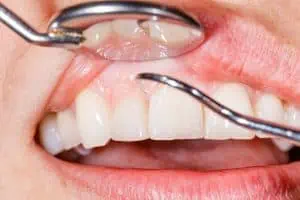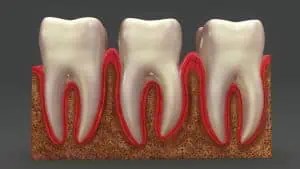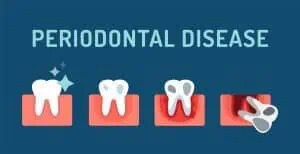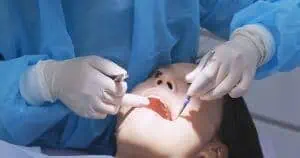Are you wondering how to stop receding gums? If you have noticed that your gums aren’t in the best condition, it’s great that you’re doing something about it now.
Our gums can recede for a number of reasons, revealing more of the tooth. Not only does this look unsightly, but it can also lead to sensitivity and other oral health problems.
So, if you’re worried about receding gums and want to know what to do about them, you’re in the right place. In this article, we will discuss:
- What causes receding gums
- Symptoms to look out for
- How to repair your gum tissue
- How to improve your overall gum health
We hope this helps you make informed decisions about your dental care and treatment.
In This Article
What should my gums look like?

Let’s begin with a quick description of what exactly healthy gums look like:
Colour isn’t always a great way to determine whether gums are healthy or not. That’s because just like we all have different levels of melanin in our skin, we all have different levels of melanin in our gums, too!
That means that people with darker skin may have darker gums and people with lighter skin may have lighter gums—in fact, healthy gums can range in colour from pink to brown and black. Although any sudden or drastic changes in the colour of your gums may be an indication that something is wrong.
But there are other ways to determine if your gums are healthy.
In general, healthy gums:
- Are firm
- Lie just against your teeth
- Don’t bleed when you brush or floss your teeth
If your gums are swollen, form large pockets around the tops of your teeth, or have the tendency to bleed, then they need some TLC and maybe even medical intervention.
So, how do you treat receding gums or reverse receding gums, medically or at home? Keep reading to find out!
What are receding gums?

Gum recession refers to a condition in which gums draw back from the teeth, leaving the roots of your teeth exposed. This condition is also called gingival recession.
There are various symptoms of gum recession. These include:
- Increased sensitivity in your tooth
- Teeth that appear longer than normal
- A notch or pocket on your gum line (the area where the gum meets the tooth).
Gum recession is a very common dental problem, in fact, over 45% of British adults have some form of gum disease, according to the British Society of Periodontology.
What causes receding gums?
What causes receding gums in most people? There are a handful of reasons, let’s go over them now!
Periodontal disease
Periodontal disease refers to the infection and inflammation of gums along with other structures in the mouth. Bacteria start building up around your gum tissue along with other debris. These bacteria form dental plaque which, in turn, causes the gums to inflame.

Factors that may contribute to periodontal disease include:
- Lack of oral hygiene
- Crooked teeth
- Faulty or damaged fillings
- Ill-fitting dentures or bridges
- Using a medication that can cause a dry mouth
- Hormonal imbalance or changes due to physiological conditions such as pregnancy or taking oral contraceptives
- Smoking
- Certain medical conditions like diabetes
There are two stages of periodontal disease:
1. Gingivitis
Gingivitis is the inflammation of gums that may result in swelling, redness, and even bleeding. Gingivitis, if not treated, can worsen and lead to periodontitis.
2. Periodontitis
Periodontitis usually follows gingivitis, setting the stage for your gums to recede. When this occurs, your gums and connective tissue start pulling away from your teeth, leading to the formation of pockets between the tooth and gums. These pockets harbour bacteria, exacerbating the inflammation and weakening the structures that hold teeth in place. In the advanced stages, you may start to lose teeth due to continued bone loss and erosion.
This short animation explains more about why gums start receding:
Forceful or incorrect brushing
As much as regular brushing is important for maintaining good oral hygiene, using incorrect brushing techniques can actually damage your teeth and gums. The part of your gum that comes into contact with the crown of the tooth is called the gingival margin.
Vigorous brushing can damage this area, triggering inflammation and gum recession along with other dental issues. Some incorrect brushing factors that can lead to gum damage and recession include:
- Brushing your teeth with too much pressure
- Using a toothbrush with hard bristles
- Brushing the teeth in long horizontal strokes
Injury
A direct injury to the gum tissue can cause the affected gum to recede. Gum damage can occur:
- While playing contact sports
- In a fall or accident
- During a dental procedure
- From wearing partial or ill-fitting dentures
Teeth grinding and clenching

Some people have a habit of grinding their teeth as they sleep. This puts a lot of pressure on the gums, and may ultimately lead to gum recession over time.
Grinding and clenching your teeth can make them loose in their sockets and create deep pockets between the tooth and gum for bacteria to accumulate and flourish. These bacteria make the gums inflamed, and ultimately, gum recession occurs.
Can receding gums grow back?
If receding gums are affecting your smile, it’s natural to wonder ‘Can receding gums be reversed?’.
In the simplest words, no, you cannot reverse receding gums; nor can they grow back by themselves. Once your gum tissue has pulled away from the tooth and receded, it is permanently damaged and there is no magic cure.
However, there are certain medical treatments that can repair receding gums and reduce any sensitivity or pain they are causing. There are also ways to cosmetically improve a smile affected by receding gums. And, perhaps most importantly, there are some medical and natural remedies that can help stop receding gums from getting any worse.
So, let’s take a look at all these options for treating gum recession.
How to fix receding gums
The best treatment for your receding gums will depend on how severe the problem is, the underlying cause, and the symptoms you’re experiencing.
Surgery to reverse receding gums
Surgery is the most drastic way to fix receding gums, and often the recommended option because it helps protect the teeth as well as improve aesthetics. There are two types of receding gums surgery that may be performed:
Gum graft surgery

Gum graft surgery is a surgical technique that can stop bone loss and gum recession from occurring any further. In addition, it may also protect the previously exposed root from decay.
There are three different types of gum graft surgery, which all involve removing gum tissue from another part of your mouth and placing it over the areas which have receded:
- Connective tissue graft
- Free gingival graft
- Pedicle (lateral) grafts
The choice usually depends on your individual needs and the extent of the damage. Your dentist will discuss different types of grafts available with you to find the best option for you.
The procedure is made pain-free with the help of local anaesthesia. During the surgery, some of the existing gum might also have to be lifted away to expose and clean the root of the tooth.
Pinhole surgical technique
Pinhole surgical technique (PST) is an innovative surgical treatment for receding gums. In PST, your dentist makes a tiny hole in your gum tissue above the exposed tooth root, then, separates the gum from your tooth root with the aid of a special tool. The gum is then stretched and repositioned over the exposed tooth root.
PST is a minimally invasive procedure and is considered the best treatment for stopping gums from receding.
The best way to stop gums from receding is to seek the appropriate treatment, in some cases a graft, as recommended by your dentist.
Gum graft surgery won’t be enough, as it’s also essential to address the underlying cause of gum recession so that it doesn’t continue to happen. Some solutions to common causes include:
- Getting a mouthguard to stop teeth grinding at night.
- Improving poor brushing techniques.
- Correcting malocclusion that’s making it hard to properly clean gums.
Dr Reshad, Sutton Place Dental Associates
How to stop receding gums without surgery

The most common reason for gums receding is plaque buildup, so the first line of treatment is usually a scale and root planing. This is like a deep clean for your teeth, including any pockets that have formed along the roots. After cleaning, the roots are smoothed with a special instrument that helps reattach the gum and tooth.
Dentists may also apply a desensitising agent or varnish to exposed tooth roots to reduce sensitivity and pain caused by receding gums.
These treatments, along with an improved dental hygiene routine, should go a long way towards stopping gum recession.
Receding gums toothpaste
You might be wondering about the best toothpaste for receding gums in the UK. Well, there is no product that will make your gums grow back, but there are toothpastes that can help with overall gum health and sensitivity.
Corsodyl’s toothpaste range is designed to target plaque build-up and improve gum health, so that’s a good place to start. If you’re suffering from sensitive teeth then Sensodyne Repair & Protect can help combat this.
It’s best to avoid abrasive whitening toothpastes as they might aggravate your gums further.
Cosmetic treatments for receding gums
If you don’t want surgery, or you are still unhappy with how your gums look after surgery, there are several cosmetic treatments you can consider.
- Pink porcelain or composite: This is a material that matches the colour of your gums and can be used to fill the gap between your gums and teeth.
- Removable gum veneers: In patients with large areas of missing gum tissue, gum-coloured veneers can be applied. These are mostly made of acrylic and silicone materials.
- Composite restoration: Tooth-coloured composite resins are used to cover the exposed surface of the root, hide any discolouration, and close gaps between teeth.
- Orthodontics: Teeth that have changed position because of gum recession can be repositioned with adult braces.
Keep in mind that these should only be performed after your oral hygiene has improved and you are free from gum disease, otherwise you are likely to experience further gum problems.
What do these receding gum treatments cost?
The good news is that treatments for gum disease are usually covered on the NHS. However, it’s down to your dentist to decide whether the severity of your condition warrants a particular treatment. You won’t get cosmetic treatments for receding gums on the NHS, and private treatment costs can vary significantly, especially for surgery.
Have a look at the following table to see what you might have to pay to fix your gums:
Treatment | NHS cost | Private cost |
Gum graft | £62.10 | £400 - £1,000 per area |
PST surgery | Not usually available | £1,000 (1-2 teeth) - £6,000 (full mouth) |
Scale and polish | £22.70 | £25 - £75 |
Root planing | £62.10 | £80 - £200 per quadrant |
Composite bonding | Not usually available | £100 - £400 per tooth |
Gum veneers | Not usually available | Around £100 per tooth |
Natural remedies for receding gums
What if you want to address your receding gums with a natural treatment? There are many natural remedies that can help prevent receding gums.
Eucalyptus oil:
According to some research, eucalyptus oil acts as an anti-inflammatory agent and stimulates new gum tissue, thereby maintaining appropriate oral health and stopping gums from receding.
Green tea:

A study performed in 2009 showed that green tea has a lot of benefits for teeth and gums. It may actually help you get rid of any gum disease. Try including two cups of green tea in your daily diet or use it as a daily mouth wash.
Septilin:
One of the most popular receding gums cures is septilin, a multi herbal preparation with multiple ingredients such as guggul, guduchi, licorice and some other compounds.
Septilin not only provides deep cleaning but also reduces the chances of tooth loss. This has been proven by a 2014 clinical trial published in the Journal of Periodontal Implant Science.
Turmeric gel:
According to a 2015 study, turmeric gel is extremely effective in the prevention of plaque formation, a major cause of gum recession. The main ingredient in this gel is curcumin, which with its anti-inflammatory and antioxidant properties, provides deep cleaning and strengthens the tooth roots.
Hydrogen peroxide:
If you have sore, red and swollen gums, hydrogen peroxide mouthwash is a good natural treatment option. As well as being an effective receding gum treatment, it protects against dental caries and reduces uncomfortable symptoms.
To make this solution, mix 60ml of 3% hydrogen peroxide with 60ml of water and rinse this mixture around in your mouth for about 30 seconds. Repeat this procedure about 2-3 times a week and avoid swallowing the solution. Many people consider this solution the best mouthwash for receding gums.
We recommend you speak to your dentist before trying any home remedies, as you may still need a hygiene treatment to stop your gums receding further.
How to stop receding gums from getting worse
If you’ve noticed you have mild receding gums, you can try making some changes to prevent further progression.
Use correct brushing techniques

To stop receding gums from getting worse, it is imperative to use the correct brushing techniques. This means:
- Place the toothbrush at a 45 degree angle against the gums
- Use gentle pressure to move the brush in small circular strokes
- Pay attention to brushing the inner, outer and biting surface of each tooth, as well as the very back of your last four teeth
- Brush for two minutes, twice a day (once before bedtime)
- Also floss once a day
Read our comprehensive guide to brushing teeth correctly for more details, and for help finding the best electric toothbrush for sensitive teeth and gums click here.
Wear a mouthguard
If teeth grinding is affecting your gums, your dentist will advise you on the best treatment. This might involve wearing a mouthguard to balance out the pressure and protect your teeth.
It’s also important to wear a mouthguard while playing contact sports, to prevent injury to the teeth and gums.
Replace ill-fitting dentures
Our gums and mouths change shape over time, so it’s important to replace or reline your dentures regularly. Ill-fitting dentures may cause gums to recede due to continual rubbing.
Visit the dentist regularly
Regular visits to a dentist or hygienist can prevent gum damage with early diagnosis and treatment.
Conclusion
Gum damage, once it has occurred, is nearly impossible to completely reverse; however, there are certain measures that can be taken to reattach and restore gum tissue around the teeth. Good oral hygiene and regular dental checkups are the key to prevent, slow down or stop gums from receding. Talk to your dentist to get tailored medical advice about treatments according to your gum condition.
FAQs
Why are my gums receding?
Multiple factors can lead to gum recession. In most cases, the cause is periodontal disease, which is a bacterial infection of gum tissue and the supporting bone.
How can I prevent gum recession?

Observing good oral hygiene is the best way to prevent gum recession. Brush and floss daily and get a dental checkup biannually. There are ways you can stop it from getting worse. If your gums are already starting to recede, quit smoking, eat a well balanced and healthy diet, and keep monitoring your gums for any changes.
How can I make my gums healthier?
Use an electric toothbrush with a special gum care head, brush your teeth correctly at least twice a day, Floss your teeth daily and massage your gums, and use a toothpaste that contains fluoride.
Journal of Indian Society of Periodontology: Etiology and occurrence of gingival recession – An epidemiological study. Consulted 20th January 2020.
Journal of Periodontology: Effect of Eucalyptus Extract Chewing Gum on Periodontal Health: A Double-Masked, Randomized Trial. Consulted 20th January 2020.
Journal of Periodontology: Relationship between intake of green tea and periodontal disease. Consulted 20th January 2020.
Journal of Periodontal and Implant Science: Herbal anti-inflammatory immunomodulators as host modulators in chronic periodontitis patients: a randomised, double-blind, placebo-controlled, clinical trial. Consulted 20th January 2020.
National Journal of Maxillofacial Surgery: Comparative evaluation of topical application of turmeric gel and 0.2% ochlorhexidine gluconate gel in prevention of gingivitis. Consulted 20th January 2020.
Healthline: Is Gargling Hydrogen Peroxide Effective and Safe? Consulted 20th January 2020.
ADA: Brushing your teeth. Consulted 20th January 2020.





